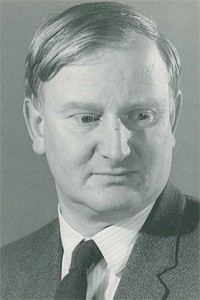18 September 2014
Tribute to Rev Malcolm France

Rev Malcolm France during his time in Colchester
The University of Essex's first Anglican chaplain, Rev Malcolm France, died on 7 July at the age of 85 at a care home in Warminster. He was chaplain from 1964 to 1973, and completed his PhD at Essex in 1975. During that time he played a key role in setting up the Nightline telephone self-help service for students. The University of Essex was the first in the world to develop a Nightline service and the idea was eventually adopted by universities across the UK and around the world.
In its origin, Nightline was a student initiative. A few of the students in the residential towers in the winter of 1969-70 often found themselves in the small hours of the night listening to their fellow students pouring out their troubles and worries. They were glad to be able to listen, but found that as a result they were not getting enough sleep! Anyway the obligation to listen every time a colleague wanted to unburden could be quite taxing. They wanted to share the load, and to be able to put up boundaries when – like before taking an exam – concentrating on someone else’s troubles was a serious disturbance.
They asked the Anglican chaplain, Malcolm France, to help them set up a Samaritan-type night-time telephone service for students. He had been director of a Samaritan branch in Yorkshire, and of course he had a lot of counselling experience from his work in the church and the chaplaincy. He recruited a couple of lecturers who happened to be volunteers with the Colchester Samaritan branch, and also brought in the Catholic chaplain, Nigel Collingwood. With their help, Malcolm organised and ran a complete training course, with talks, roleplays and a selection process at the end.
At 10 pm on 7 May 1970, with great trepidation, Malcolm and a couple of volunteers launched the Nightline service from a disused hut on the perimeter of the university grounds. It had been Barclays Bank, and then the chaplains’ centre, but both had subsequently moved to more comfortable premises. The hut had two offices, where the two Nightliners slept, and a central office with a telephone – but no loo! Volunteers either had to pester the security guards at Wivenhoe House or discreetly use what might be called the al fresco facilities around the hut.
Malcolm continued to provide back-up in the early years of Nightline, checking on the log-book and helping volunteers to cope with especially difficult cases. Without his devoted work, Nightline would not have become the settled and respected institution it is now, not only at Essex but at many higher education institutions around the country.
Professor Geoffrey Hosking (Department of Government and Department of History, University of Essex 1966-1984)
...more news releases